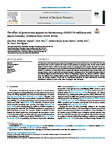The effect of government support on Bureaucracy, COVID-19 resilience and export intensity: Evidence from North Africa
| dc.contributor.author | Onjewu, A-KE | |
| dc.contributor.author | Olan, F | |
| dc.contributor.author | Nyuur, RB-B-I | |
| dc.contributor.author | Paul, S | |
| dc.contributor.author | Nguyen, HTT | |
| dc.date.accessioned | 2023-02-14T12:46:06Z | |
| dc.date.issued | 2023-02 | |
| dc.identifier.issn | 0148-2963 | |
| dc.identifier.issn | 1873-7978 | |
| dc.identifier.other | 113468 | |
| dc.identifier.uri | http://hdl.handle.net/10026.1/20358 | |
| dc.description.abstract |
The literature on the imperativeness of government support for firm survival since the onset of COVID-19 is vast, but scholars have scarcely considered the impact of such assistance on managers' time, nor the extent to which support measures induce resilience and export activity. Accordingly, this study assesses the impact of government support on (1) bureaucracy and (2) resilience using data from 535 Moroccan SMEs. It further evaluates the influence of resilience on direct versus indirect exports, and espouses the institutional voids, resource-based and strategy-creation view to explain the associations through a contingency lens. The results demonstrate that (1) government support increases bureaucracy which, (2) surprisingly triggers and enhances resilience. Furthermore, (3) resilience has a positive impact on direct exports but (4) adversely affects indirect exports. Theoretically, the findings acquiesce extant calls for measurement specificity in export performance. Practically, stakeholders' attention is drawn to the value of managers' time well spent. | |
| dc.format.extent | 113468-113468 | |
| dc.format.medium | Print-Electronic | |
| dc.language | en | |
| dc.language.iso | eng | |
| dc.publisher | Elsevier BV | |
| dc.subject | Government Support | |
| dc.subject | Bureaucracy | |
| dc.subject | Resilience | |
| dc.subject | Direct Exports | |
| dc.subject | Indirect Exports | |
| dc.subject | Morocco | |
| dc.title | The effect of government support on Bureaucracy, COVID-19 resilience and export intensity: Evidence from North Africa | |
| dc.type | journal-article | |
| dc.type | Journal Article | |
| plymouth.author-url | https://www.webofscience.com/api/gateway?GWVersion=2&SrcApp=PARTNER_APP&SrcAuth=LinksAMR&KeyUT=WOS:000913176900012&DestLinkType=FullRecord&DestApp=ALL_WOS&UsrCustomerID=11bb513d99f797142bcfeffcc58ea008 | |
| plymouth.volume | 156 | |
| plymouth.publication-status | Published | |
| plymouth.journal | Journal of Business Research | |
| dc.identifier.doi | 10.1016/j.jbusres.2022.113468 | |
| plymouth.organisational-group | /Plymouth | |
| plymouth.organisational-group | /Plymouth/Faculty of Arts, Humanities and Business | |
| plymouth.organisational-group | /Plymouth/Faculty of Arts, Humanities and Business/Plymouth Business School | |
| dc.publisher.place | United States | |
| dcterms.dateAccepted | 2022-11-15 | |
| dc.rights.embargodate | 2023-2-15 | |
| dc.identifier.eissn | 1873-7978 | |
| dc.rights.embargoperiod | Not known | |
| rioxxterms.versionofrecord | 10.1016/j.jbusres.2022.113468 | |
| rioxxterms.licenseref.uri | http://www.rioxx.net/licenses/all-rights-reserved | |
| rioxxterms.licenseref.startdate | 2023-02 | |
| rioxxterms.type | Journal Article/Review |


